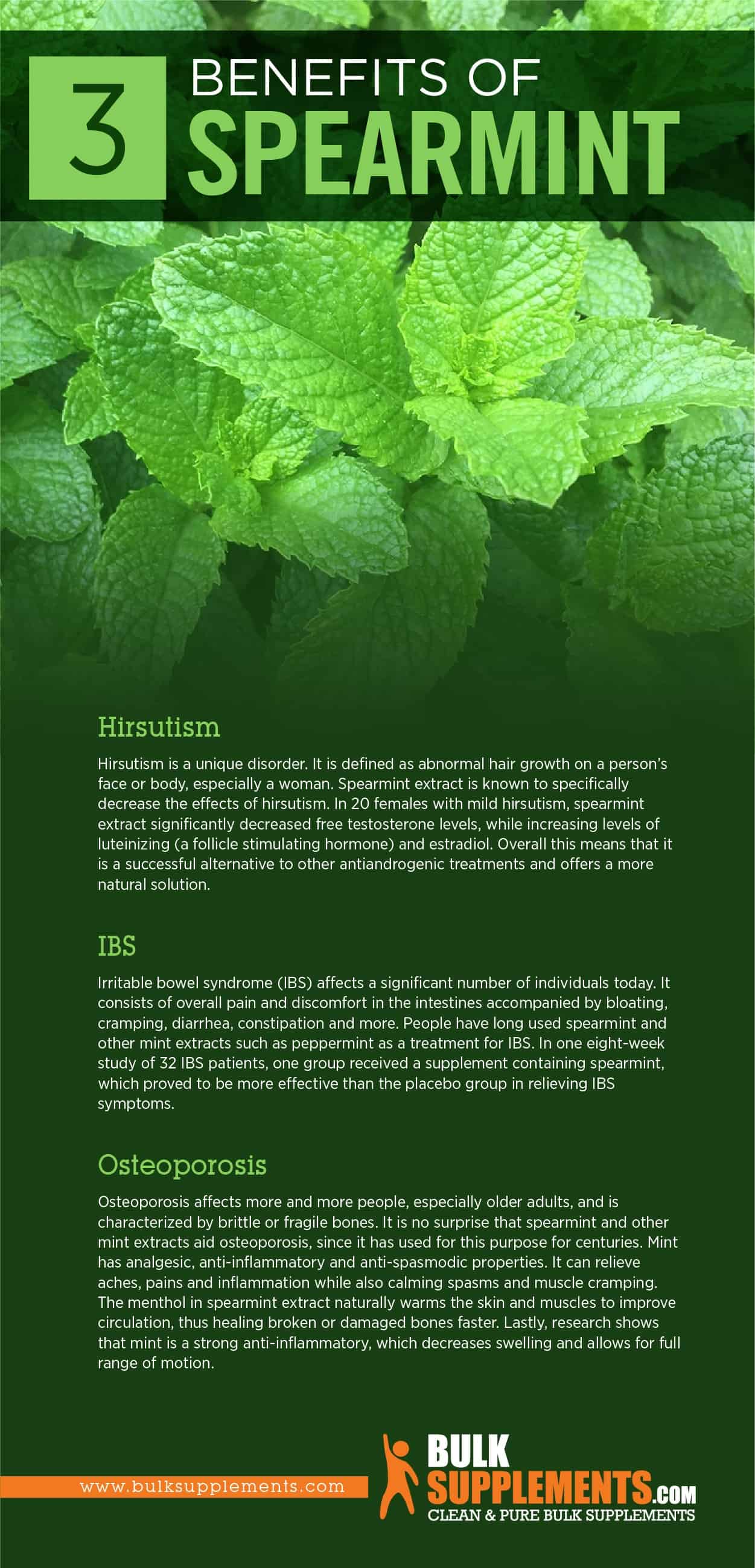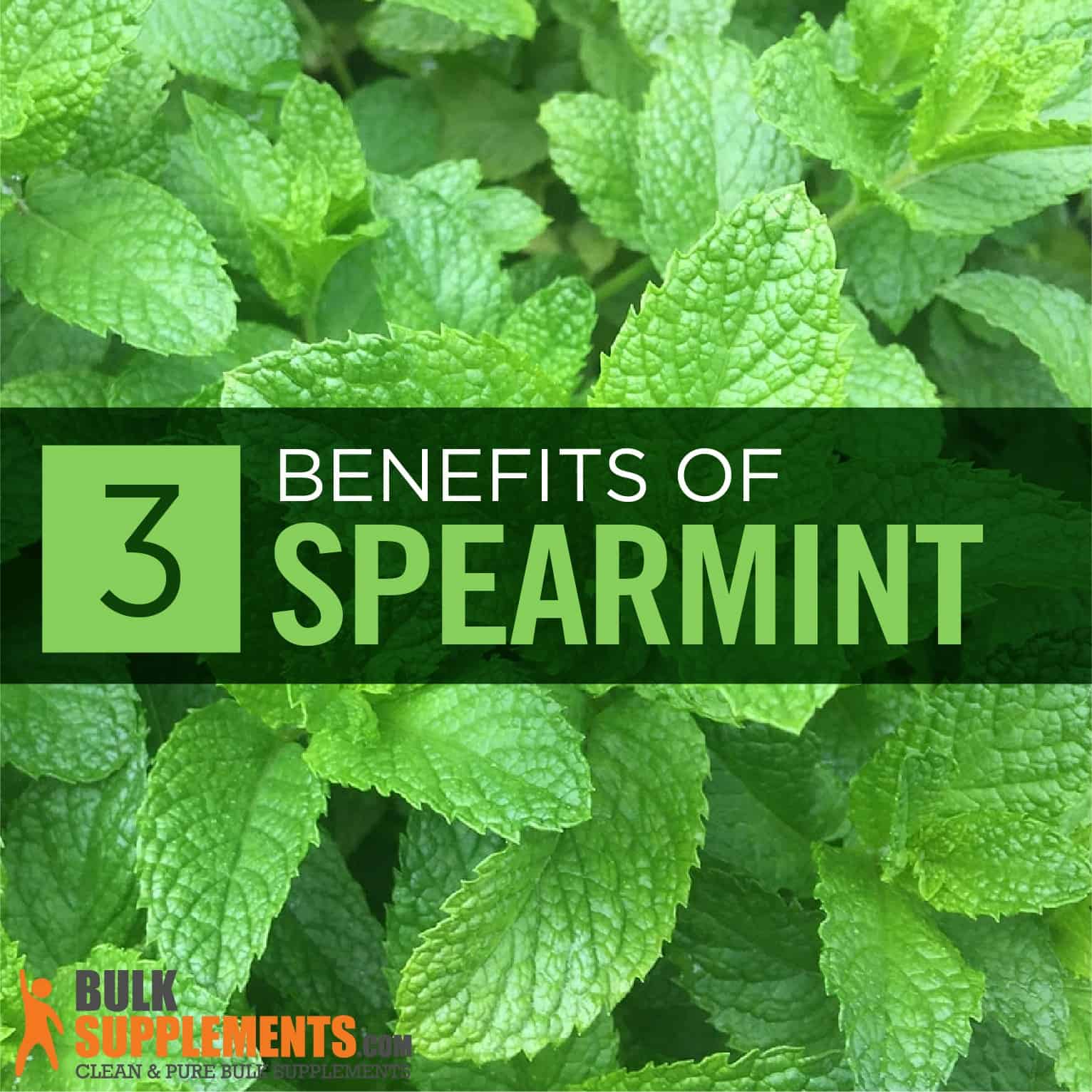What is Spearmint Extract?
Like the gum, right? Yes, like the gum, but also like the toothpaste, mouthwashes and various cosmetics you use on a daily basis. Maybe you’ve never stopped to really think about spearmint extract, but it’s been around you for some time.
Spearmint is not peppermint. It is similar to peppermint, but it is not the same. Spearmint is sweet, peppermint is not. Spearmint has less menthol, and peppermint has more.
People use the plant more commonly for medicinal and therapeutic treatment, and it contains several vitamins, antioxidants and essential nutrients. Chances are your grandmother believed in old spearmint remedies to ‘cure’ sore throat, arthritis, cramps, toothaches, bad breath, the common cold, diarrhea, muscle pain, headache, fatigue and overall stress. The most common benefits are for hirsutism, irritable bowel syndrome (IBS) and osteoporosis.
What Does Spearmint Come From?
Spearmint is native to the Balkan Peninsula in Turkey, as well as Europe and Asia. Today you can also find it in Africa, North and South America. It is also known as garden mint and common mint; both easily found and easy to be grown. The plant has a square-shaped stem and the leaves are pointed and spear-shaped, hence the name. The leaves are usually 5 to 9 centimeters long and 1.5 to 3 centimeters wide (x).
Spearmint Extract Benefits
Hirsutism
Hirsutism is a unique disorder. It is defined as abnormal hair growth on a person’s face or body, especially a woman. Spearmint extract is known to specifically decrease the effects of hirsutism. In 20 females with mild hirsutism, spearmint extract significantly decreased free male hormones levels, while increasing levels of luteinizing (a follicle stimulating hormone) and estradiol. Overall this means that it is a successful alternative to other antiandrogenic treatments and offers a more natural solution (x).
IBS
Irritable bowel syndrome (IBS) affects a significant number of individuals today. It consists of overall pain and discomfort in the intestines accompanied by bloating, cramping, diarrhea, constipation and more. People have long used spearmint and other mint extracts such as peppermint as a treatment for IBS. In one eight-week study of 32 IBS patients, one group received a supplement containing spearmint, which proved to be more effective than the placebo group in relieving IBS symptoms (x).
Osteoporosis
Osteoporosis affects more and more people, especially older adults, and is characterized by brittle or fragile bones. It is no surprise that spearmint and other mint extracts aid osteoporosis, since it has been used for this purpose for centuries. Mint has analgesic, anti-inflammatory and anti-spasmodic properties. It can relieve aches, pains and inflammation while also calming spasms and muscle cramping. The menthol in spearmint extract naturally warms the skin and muscles to improve circulation, thus healing broken or damaged bones faster. Lastly, research shows that mint is a strong anti-inflammatory, which decreases swelling and allows for full range of motion (x).

Spearmint Extract Side Effects
Allergic Reaction
As with any new treatment or remedy, spearmint extract may cause an allergic reaction. This is especially true when used on the skin. If using spearmint extract on the skin, be sure to combine with a carrier oil such as coconut or almond oil to decrease its potency. If you experience an allergic reaction on the face, mouth, or throat, stop use and contact your medical provider immediately. Otherwise, mild allergic reactions should typically disappear after use.
Sedative Effects
While some people may chew spearmint gum to stay awake, others know that it actually has a natural sedating effect. Spearmint contains a chemical that naturally causes sleepiness and drowsiness. This makes it important to avoid sedative and sleep medications while using this extract. Otherwise, drowsiness and tiredness might occur.
Other Side Effects and Warnings
Spearmint is possibly unsafe during pregnancy and breastfeeding when taken in large amounts. Since not enough research is available to support using it during pregnancy, it is best to avoid it altogether. Spearmint extract may also cause kidney and liver damage. The higher amount of it you consume, the greater the damage.
Spearmint Extract Dosage
Spearmint extract is a natural supplement, but natural never means risk-free. Taking any supplement in large doses can be harmful. When supplementing with spearmint extract powder, take 800 mg (about 1/3 tsp) daily (or as directed by a physician). It is best taken with meals.
Interactions
It is important not to take spearmint with sedative medications (CNS depressants). This is because it already causes sleepiness and drowsiness, which should not be further increased by other sedatives. You should also not take the extract if you are taking medications that can harm the liver or hepatoxic drugs. Spearmint can also have liver damaging effects, so taking them in conjunction with other medications that do so can have serious effects. These medications include Tylenol, Cordarone, Sporanox and others.
Why Take Spearmint Extract?
We can all benefit from spearmint extract. Whether to improve nausea, sore throat, indigestion, gas, toothache or headache, it has proven natural effects on all of these symptoms. Researchers claim that it has good total phenolic and flavonoid contents, also making it an excellent source of antioxidants. It even has antifungal properties and can be used directly on the skin to reduce swelling.
The Bottom Line
No one can resist the minty freshness of spearmint. With few known side effects and several known benefits and uses, in addition to a variety of cosmetic uses, it’s no surprise that it’s so popular. Not only can it cure a small case of bad breath, but it can also improve hirsutism, osteoporosis and IBS.


